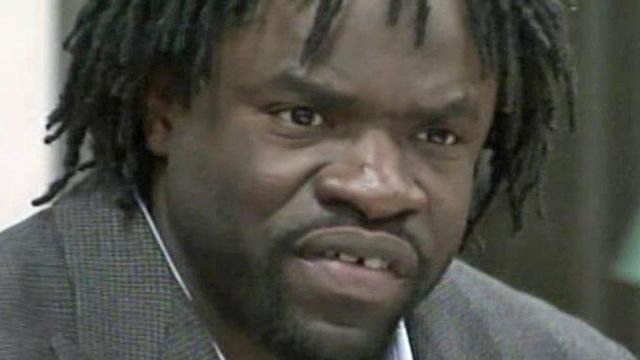Former prosecutor denies race played role in death penalty trial
Race didn't play a significant role in the exclusion of black jurors from the case of a death row prisoner who is challenging his sentence under North Carolina's Racial Justice Act, a former prosecutor testified Monday.
Posted — UpdatedDistrict Court Judge John Dickson, a former assistant district attorney in Cumberland County, said he didn't use peremptory challenges to exclude black jurors in the 1994 murder trial of Marcus Robinson.
Robinson, who is black, was sentenced to death for killing a white teenager in 1991.
"In no way, shape or form," Dickson said in response to a question from District Attorney Cal Colyer about whether race played a role in jury selection in the Robinson case and two other death penalty cases.
In 2009, the legislature approved the Racial Justice Act, which allows death row prisoners and defendants facing the death penalty to use statistics and other evidence to show racial bias played a significant role in either their sentences or prosecutors' decision to pursue the death penalty.
The law says that if the claim is successful, the prisoner's death sentence is reduced to life in prison without parole.
This hearing, expected to last about two weeks, addresses Robinson's claim that race was a factor in prosecutors' decisions to reject potential jurors who were black. Robinson also claims that race was a factor in the prosecutors' decisions to seek the death penalty against accused murderers and that the victims' race was a factor in whether juries issued death sentences.
Superior Court Judge Greg Weeks is hearing the case, which doesn't have a jury.
Dickson and Robinson's attorney got into a testy exchange during the hearing.
"Sometimes racism is a subconscious factor, and I can be as guilty of it as you in practicing it – subconsciously," Dickson said. "In my mind, that has never been a significant factor in my selection of a jury.
Prosecutors and defense attorneys could have any of a hundred reasons for dismissing potential jurors, notably their views toward the death penalty, he said.
"There are things that have to do with jury selection that have absolutely nothing to do with race, one way or the other," he said.
"Excuse me, and I don't want to disparage prosecutors. I hold prosecutors in high regard," Ferguson interrupted.
"I doubt it," Dickson retorted.
Dickson testified that he excluded five black potential jurors in the pool for Robinson's trial and forwarded another five to the defense for consideration. He testified that he thought three blacks served on the 12-person jury, but the record shows the jury included two blacks and one American Indian.
"It's not a cut-and-dried situation," he said, referring to notes he took during jury selection about the black jurors he decided to exclude.
"(One woman) didn't believe in the death penalty. She didn't think she could vote for it under any circumstance because of a guilty conscience," he said.
Ferguson asked him whether he thought racism still exists in the judicial system.
“I think it occurs everywhere. It’s an imperfect world and always will be,” Dickson replied.
Robinson came close to death in January 2007, but a judge blocked his scheduled execution. His victim, 17-year-old Erik Tornblom, was shot in the face after he agreed to give Robinson and another man a ride from a convenience store. A co-defendant, Roderick Williams, is serving a life sentence.
In his opening statement, Cumberland County Assistant District Attorney Rob Thompson said the prosecution's case would involve more than the statistics that the defense offered as evidence last week.
"Statistics alone are not sufficient to complete the factual picture about capital cases in North Carolina," Thompson said.
The prosecution will show that race wasn't a significant factor in the selection of capital case juries in Cumberland County or North Carolina, he said. Weeks will "see that it's not appropriate to abandon work done by the court, defense attorneys, prosecutors and appellate courts," Thompson said.
A defense witness testified last week that qualified black jurors were struck at the rate of 50 percent, while non-black jurors were struck at a rate of 14.3 percent in Robinson's case. That meant that blacks were 3.5 times more likely to be struck than whites, the witness said.
Dickson said people can use statistics to support any argument – “My experience with statistics is you can make them say whatever damn thing you want to,” he said – and Thompson said his evidence would show that black potential jurors had the same chance of serving on Robinson's jury as whites.
• Credits
Copyright 2024 by WRAL.com and the Associated Press. All rights reserved. This material may not be published, broadcast, rewritten or redistributed.






